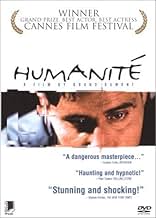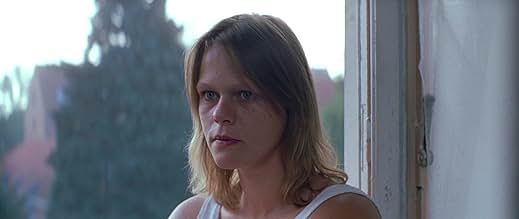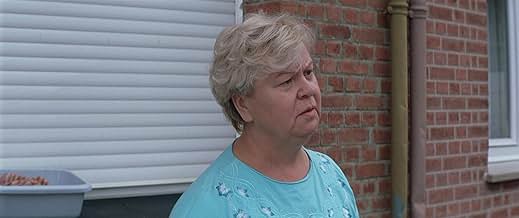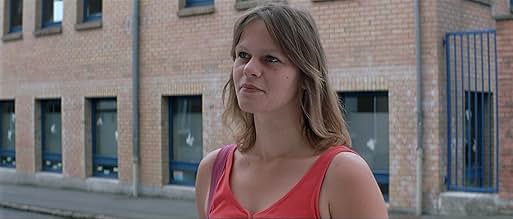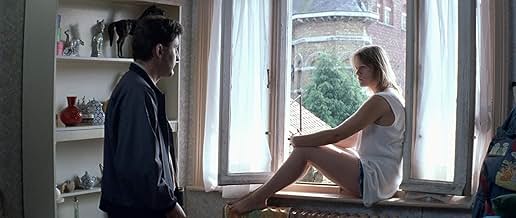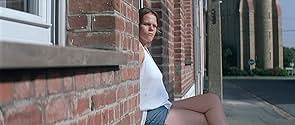NOTE IMDb
6,8/10
5,3 k
MA NOTE
Un détective de police qui a oublié comment ressentir des émotions - à cause de la mort de sa propre famille dans une sorte d'accident - enquête sur un crime mystérieux, qui s'avère poser pl... Tout lireUn détective de police qui a oublié comment ressentir des émotions - à cause de la mort de sa propre famille dans une sorte d'accident - enquête sur un crime mystérieux, qui s'avère poser plus de questions qu'il n'apporte de réponses.Un détective de police qui a oublié comment ressentir des émotions - à cause de la mort de sa propre famille dans une sorte d'accident - enquête sur un crime mystérieux, qui s'avère poser plus de questions qu'il n'apporte de réponses.
- Réalisation
- Scénario
- Casting principal
- Récompenses
- 3 victoires et 3 nominations au total
Darius
- L'infirmier
- (as Daniel Leroux)
Robert Bunzi
- Le policier anglais
- (as Robert Bunzl)
Avis à la une
Bruno Dumont is something of a controversial filmmaker, producing singular films that draw on the influence of people like Robert Bresson, Ingmar Bergman and early Michael Haneke in a clear attempt to create an enhanced state of realism that works both for and against the film and the audience. Also, like his contemporaries Gaspar Noé and Carlos Reygadas, it could be argued that Dumont makes films that challenge the viewer to engage with a story that will undoubtedly take us to some very dark and often shockingly immoral places; giving us characters that are morally ambiguous, often loathsome and, in the case of our central protagonist here, almost pitiful. There aren't many filmmakers who would choose as their hero of a bleak detective thriller an innocent man-child who seems to be as socially inept and emotionally damaged as a person could possibly be, and yet, with Police Chief Pharaon De Winter, that is exactly what we get.
Dumont makes his bleak, desolate vision obvious right from the start, with the horrendous discovery of a murdered and mutilated child left naked and bleeding in a stark, autumnal field. The image is both shocking and brutal; with Dumont giving us a punch to the stomach right from the very first frame with a lingering close-up of the wound and filleted body parts. It's an image that both establishes and surmises the film as a thematic whole; the loss of innocence being central both with the murder of the child and with the character of Pharaon himself. It is the idea of back-story and the fragile demeanour of Pharaon - and to an extent the evocative performance of non-professional actor Emmanuel Schotte - which anchors the film, giving the audience an emotional spectator. He is also our representation within the film, mirroring the feelings of the audience if not quite our actions. After the aforementioned discovery there are no macho heroics; Pharaon reacts on an emotional level unseen in films of this nature, running back to his car, tears streaming down his face, lost in a kind of detached melancholy that continues throughout the film.
Over the course of the film, the narrative continues to unfold at a slow and deliberate pace, though we quickly realise that the real detective story at hand is not necessarily about the murder of the child, but more importantly, what has happened to make Pharaon the way he is. Has Pharaon had some sinister part in all of this, or is he merely a constant observer. The idea of voyeurism is an important one in Dumont's work, with the camera rarely moving; always static, removed from the context of the scene and merely recording things for our benefit. This gives the film a greater degree of realism, though may be a little tiresome for viewers weaned on a more westernised approach to cinema, with one hypnotic scene in particular finding our central protagonist tending his allotment for what seems like the best part of fifteen minutes.
As the film continues to unfold, and the clues begin to add up, we realise that this isn't going to have a clear-cut, moralistic ending akin to a routine police/crime thriller. Then again, with a central character who lives at home with a controlling mother, who adores the woman who lives down the street and allows her boyfriend to belittle him at every available opportunity and often stands monosyllabic at the back of a room... how on earth could it? With L'Humanité (1999), Dumont has attempted to create a stripped down, bare-naked form of ambient cinema, in which it is the little character details and passages of silence, broken only by shocking violence and mechanical sex, that go towards creating the story.
The ending of the film continues in this same vein and acts as a sort of shocking epiphany, in which every action and subtle line of dialog that has occurred during the epic running time is suddenly given a whole new meaning. Dumont has proved with this, his second feature, that he can reach beyond the tiresome kitchen sink theatrics of his first film, La Vie de Jesus (1997) and incorporate distancing naturalistic techniques (no camera movements, no artificial light, non-professional actors, etc) to create a film that is both horrendous and intoxicating in equal measures. Though enjoy is certainly the wrong word to use with a film this bleak and confrontational, those amongst you who admire the work of forward thinking European auteurs like the aforementioned Michael Haneke, Gaspar Noé and Lars von Trier will certainly admire and appreciate Dumont's shattering tour-de-force.
Dumont makes his bleak, desolate vision obvious right from the start, with the horrendous discovery of a murdered and mutilated child left naked and bleeding in a stark, autumnal field. The image is both shocking and brutal; with Dumont giving us a punch to the stomach right from the very first frame with a lingering close-up of the wound and filleted body parts. It's an image that both establishes and surmises the film as a thematic whole; the loss of innocence being central both with the murder of the child and with the character of Pharaon himself. It is the idea of back-story and the fragile demeanour of Pharaon - and to an extent the evocative performance of non-professional actor Emmanuel Schotte - which anchors the film, giving the audience an emotional spectator. He is also our representation within the film, mirroring the feelings of the audience if not quite our actions. After the aforementioned discovery there are no macho heroics; Pharaon reacts on an emotional level unseen in films of this nature, running back to his car, tears streaming down his face, lost in a kind of detached melancholy that continues throughout the film.
Over the course of the film, the narrative continues to unfold at a slow and deliberate pace, though we quickly realise that the real detective story at hand is not necessarily about the murder of the child, but more importantly, what has happened to make Pharaon the way he is. Has Pharaon had some sinister part in all of this, or is he merely a constant observer. The idea of voyeurism is an important one in Dumont's work, with the camera rarely moving; always static, removed from the context of the scene and merely recording things for our benefit. This gives the film a greater degree of realism, though may be a little tiresome for viewers weaned on a more westernised approach to cinema, with one hypnotic scene in particular finding our central protagonist tending his allotment for what seems like the best part of fifteen minutes.
As the film continues to unfold, and the clues begin to add up, we realise that this isn't going to have a clear-cut, moralistic ending akin to a routine police/crime thriller. Then again, with a central character who lives at home with a controlling mother, who adores the woman who lives down the street and allows her boyfriend to belittle him at every available opportunity and often stands monosyllabic at the back of a room... how on earth could it? With L'Humanité (1999), Dumont has attempted to create a stripped down, bare-naked form of ambient cinema, in which it is the little character details and passages of silence, broken only by shocking violence and mechanical sex, that go towards creating the story.
The ending of the film continues in this same vein and acts as a sort of shocking epiphany, in which every action and subtle line of dialog that has occurred during the epic running time is suddenly given a whole new meaning. Dumont has proved with this, his second feature, that he can reach beyond the tiresome kitchen sink theatrics of his first film, La Vie de Jesus (1997) and incorporate distancing naturalistic techniques (no camera movements, no artificial light, non-professional actors, etc) to create a film that is both horrendous and intoxicating in equal measures. Though enjoy is certainly the wrong word to use with a film this bleak and confrontational, those amongst you who admire the work of forward thinking European auteurs like the aforementioned Michael Haneke, Gaspar Noé and Lars von Trier will certainly admire and appreciate Dumont's shattering tour-de-force.
On the surface, L'Humanite is about a detective, Pharaon, dealing with his hyper sensitive nature to a rape/murder of a young girl he is investigating, but especially for his unrequited love to his neighbor, Domino. Pharoan is like a wounded, or fearful child, dumpy, perpetually slumped over, soft spoken, watery eyed, whereas Domino is considerably working class, modern, damaged, but not nearly as fearful, at least, not as openly sensitive; unlike Pharaon, she doesn't wear her fear like bad suit. But, that is just the surface of the characters and story, the actual definition of these key elements is left up to the viewer. The plot and the characters are fragments. Instead of miring itself in details, long monologues, heavy dialogue in general, or normal cinematic conventions, the film is purposefully left incomplete in many areas. Thus, the viewer is left to speculate how these gaps should be filled, left to ponder the scraps given to them.
For example, we are told Pharaon's girlfriend and child left him, but not why. Is Pharaon's sensitivity a product of his being abandoned by this woman, or was his sensitivity the cause of her leaving? Domino is clearly upset when Pharaon mentions the case of the rape/murder of the young girl, but is her reaction just empathy, or something deeper? For every detail we are given, there are often unresolved questions that are never conveniently answered.
It somewhat reminds me of a Shohei Imamrua film, like Vengeance is Mine or The Eel, in that the story unfolds through rather mundane scenes, but these scenes end up speaking volumes over the course of the film. You could also say it is a bit like Antonioni as well, as the ordinary, often bright, landscape often contributes just as much emotion as the characters. Basically, Brumo Dumont, like Imamura or Antonioni, eschews normal narrative conventions to tell a story. He lets the viewer fill in the gaps, and much of the film will always remain an engaging mystery.
For example, we are told Pharaon's girlfriend and child left him, but not why. Is Pharaon's sensitivity a product of his being abandoned by this woman, or was his sensitivity the cause of her leaving? Domino is clearly upset when Pharaon mentions the case of the rape/murder of the young girl, but is her reaction just empathy, or something deeper? For every detail we are given, there are often unresolved questions that are never conveniently answered.
It somewhat reminds me of a Shohei Imamrua film, like Vengeance is Mine or The Eel, in that the story unfolds through rather mundane scenes, but these scenes end up speaking volumes over the course of the film. You could also say it is a bit like Antonioni as well, as the ordinary, often bright, landscape often contributes just as much emotion as the characters. Basically, Brumo Dumont, like Imamura or Antonioni, eschews normal narrative conventions to tell a story. He lets the viewer fill in the gaps, and much of the film will always remain an engaging mystery.
It is said that Humanite is not for everyone. And i would surely support that claim since I am a steward in the Tel Aviv Cinematheque and had to get up, about every two minutes to open the door to someone sneaker.
Still, I managed to get quite a clear impression of the film which is in my opinion a superb one. Although many people find themselves puzzled by the characters (virtually everyone in the show i attended came out of the cinema looking almost personally insulted by the film) i think that if you know and love Dostoevsky's books you won't find them so hard to understand. Pharaon is simply Prince Mishkin. He is assulted by the bluntness and cruelness of existence and the crime he tries to solve - but is overwhelmed with humility, love and compassion to the world. While his friend make love in a way that seems almost like a rape he makes love to the world, to the clods of the earth. When he rides his bicycle his upper body seems to be moving as if he was making love. But most of all he feels diligent compassion to the world and it's assaulters. The film shows the violence everywhere. Pharaon sees this violence and with his deep gaze manages to disarm it (with protesters and with Domino). I think that Pharaon is a really great acting performance. Pharaon like Mishkin in Dostoevky's notebooks 'sees not in the faces of people but in their hearts.'. The investigation taking place is like an investigation of the inner self. Of the human soul, of humanity. It's a category against Humanity and Pharaon's who is the categor manages to find compassion to humanity. Its sort of like an 'apocalypse now' in rural france.
Still, I managed to get quite a clear impression of the film which is in my opinion a superb one. Although many people find themselves puzzled by the characters (virtually everyone in the show i attended came out of the cinema looking almost personally insulted by the film) i think that if you know and love Dostoevsky's books you won't find them so hard to understand. Pharaon is simply Prince Mishkin. He is assulted by the bluntness and cruelness of existence and the crime he tries to solve - but is overwhelmed with humility, love and compassion to the world. While his friend make love in a way that seems almost like a rape he makes love to the world, to the clods of the earth. When he rides his bicycle his upper body seems to be moving as if he was making love. But most of all he feels diligent compassion to the world and it's assaulters. The film shows the violence everywhere. Pharaon sees this violence and with his deep gaze manages to disarm it (with protesters and with Domino). I think that Pharaon is a really great acting performance. Pharaon like Mishkin in Dostoevky's notebooks 'sees not in the faces of people but in their hearts.'. The investigation taking place is like an investigation of the inner self. Of the human soul, of humanity. It's a category against Humanity and Pharaon's who is the categor manages to find compassion to humanity. Its sort of like an 'apocalypse now' in rural france.
What's this about quiet small towns that so capture the curiosity and imagination of film-makers. Here we have another study by the director of the Life of Jesus (which incidentally is about a small town too)which shows, from the surface, how a Police Superintendant copes with the brutal rape and murder of a young girl. With this as a background, the film proceeds to show the aimlessness in the protanganist's life and his relationships with the people around him.
While the pace of the film is slow, you do get a feeling that such an approach is necessary. As such, you get many long shots. You also get shots that are very upfront and will no doubt make many in the audience feel uneasy.
There will be many different comments about the show. I heard some French guys coming out of the cinema and lauding it as "Pure Cinema" while others have complained that it was pretentious. For me, I thought it was boring.
While the pace of the film is slow, you do get a feeling that such an approach is necessary. As such, you get many long shots. You also get shots that are very upfront and will no doubt make many in the audience feel uneasy.
There will be many different comments about the show. I heard some French guys coming out of the cinema and lauding it as "Pure Cinema" while others have complained that it was pretentious. For me, I thought it was boring.
In this case, largely one man's reality, although several others are involved. I hesitate to make literary comparisons, because film is a visual medium with its own immediacy, but the central characters of the novels by Emmanuel Bove and Patrick Susskind ("The Pigeon" in particular) put me very much in mind of Pharaon de Winter, the "hero" of this film and is one reason I love it. The inwardness,the soulful need that is barely understood by the man himself, the sometimes interminably slow pace bring a profound melancholic tone that I have rarely experienced on the screen.
I agree with others who've posted here, this isn't a film for everyone. But if you are moved by the deep existential reflection and quiet, sensitive behavior of a person who can empathize out of his/her own pain, I would recommend this movie.
I agree with others who've posted here, this isn't a film for everyone. But if you are moved by the deep existential reflection and quiet, sensitive behavior of a person who can empathize out of his/her own pain, I would recommend this movie.
Le saviez-vous
- AnecdotesThe body of the raped little girl was a silicone cast.
- Citations
[first lines]
l'inspecteur de police Pharaon De Winter: I'm coming.
- Versions alternativesItalian distributor BIM originally removed about 2 minutes of sex footage from the Italian theatrical release in order to avoid a 'not under 18' rating. When the press criticized this self-censorship attempt, the distributor reissued the film in its original, integral form.
- Bandes originalesLe Vertigo, Rondeau. Modérément
from "Pièce de Clavecin"
Music by Pancrace Royer
Performed by William Christie
Courtesy of harmonia mundi
Meilleurs choix
Connectez-vous pour évaluer et suivre la liste de favoris afin de recevoir des recommandations personnalisées
- How long is Humanité?Alimenté par Alexa
Détails
- Date de sortie
- Pays d’origine
- Sites officiels
- Langues
- Aussi connu sous le nom de
- Humanity
- Lieux de tournage
- Bailleul, Nord, France(Village)
- Sociétés de production
- Voir plus de crédits d'entreprise sur IMDbPro
Box-office
- Montant brut aux États-Unis et au Canada
- 113 495 $US
- Week-end de sortie aux États-Unis et au Canada
- 10 075 $US
- 18 juin 2000
- Durée
- 2h 21min(141 min)
- Couleur
- Mixage
- Rapport de forme
- 2.35 : 1
Contribuer à cette page
Suggérer une modification ou ajouter du contenu manquant

